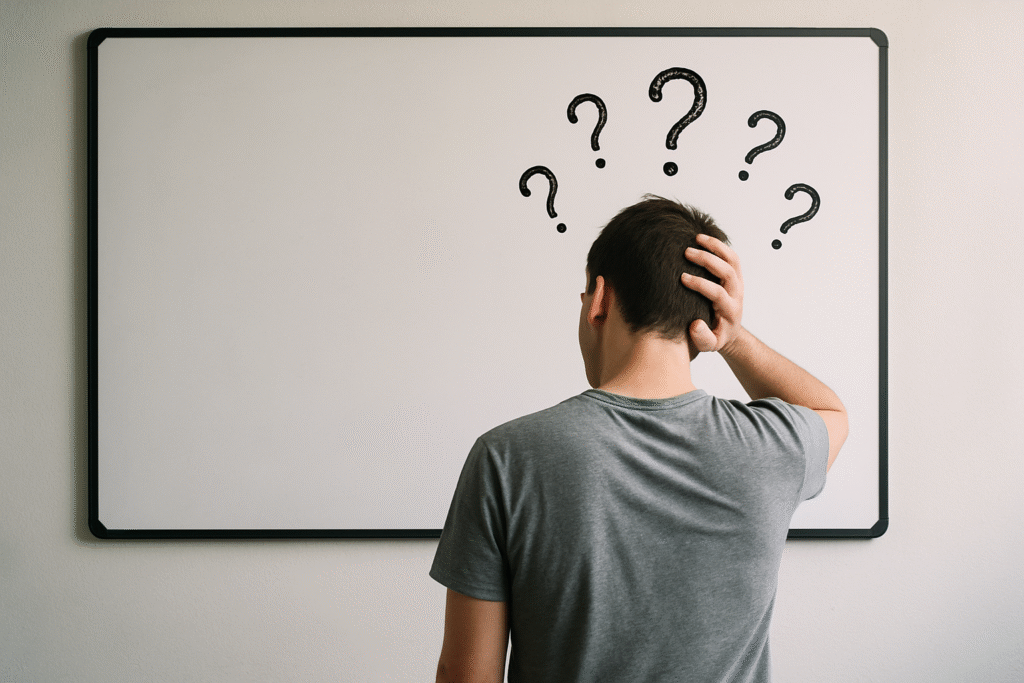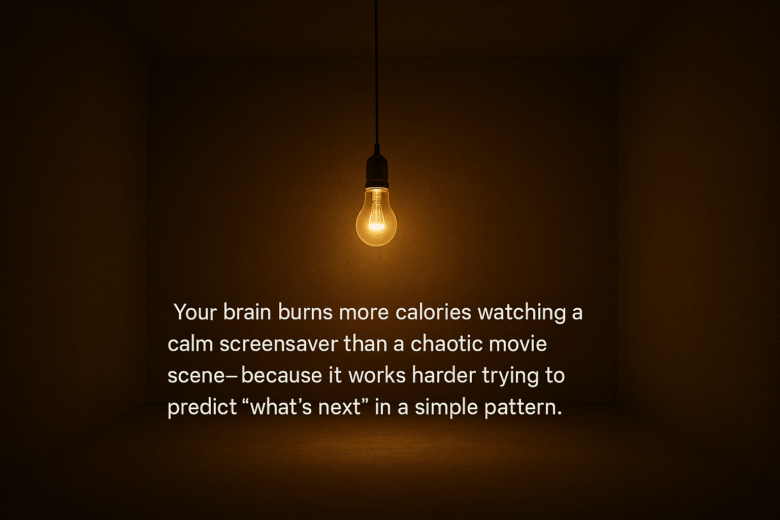Fun Fact: Your brain burns more calories watching a calm screensaver than a chaotic movie scene—because it works harder trying to predict “what’s next” in a simple pattern.
Simplicity sounds like a gift. A clean desk. A short email. A minimalist home. But here’s the twist: your brain doesn’t find simplicity relaxing—it finds it unsettling.
We praise simplicity in theory, but crave complexity in practice. We overthink texts, overdecorate rooms, and overcomplicate systems, even when simplicity would serve us better. Why? Because the brain is a pattern-seeking machine wired for survival, not serenity. And in that wiring, simplicity doesn’t always feel safe. Welcome to the strange world of cognitive complexity, where less is often more exhausting.
The Brain’s Need for Complexity
From an evolutionary perspective, our ancestors survived by noticing what was off—not what was ordinary. A rustling bush might hide a predator. A break in routine could signal danger. This bias toward novelty and complexity helped us stay alive.
But it came with a side effect: our brains now find simplicity “boring” and even threatening. In a world full of constant stimuli, simplicity is like silence in a horror film—it makes the brain lean in and whisper, “What am I missing?”
Simplicity Feels Incomplete
A blank page. An empty hallway. A design with too much white space. These can trigger discomfort. Why?
Because the human brain is built to fill in gaps, it’s called apophenia—the tendency to perceive connections or patterns where none exist. That’s why we see faces in clouds or assume tone in a text with no punctuation.
In the absence of complexity, the brain creates its own. And sometimes, it makes things worse.
Case Study:
In a 2004 study published in the journal Science, participants shown abstract images preferred those with more visual elements—even if they claimed to like “simplicity.” The complexity gave their brains more to work with. In contrast, too much simplicity left them uneasy and unsure.
The Curse of Overthinking
Consider this: you get a one-word message—”Sure.” No emojis. No context. Instead of seeing it as agreement, your brain wonders: Are they upset? Are they being sarcastic? What did I do wrong?
This is classic cognitive overload triggered by simplicity.
The less information the brain has, the more it fills in the blanks. And because of the negativity bias—a survival mechanism—it often fills those blanks with worst-case scenarios. Simplicity, then, becomes a canvas for paranoia.
The Brain and the “Default Mode Network”
When you’re not doing anything—just daydreaming or staring at a wall—a network in your brain lights up: the Default Mode Network (DMN). It’s associated with self-referential thoughts, memory, and imagination.
But here’s the twist: it also gets more active when things are simple. That empty schedule? That quiet morning? Your brain doesn’t relax—it wanders. And sometimes it wanders into worry, shame, or rumination.
This is why some people feel more anxious during leisure than during chaos.
Research Insight:
A 2014 Harvard study found that people would rather receive electric shocks than sit alone with their thoughts for 15 minutes. The simplicity of silence made them uncomfortable.
Why We Complicate Our Lives
We often add complexity not because we need to—but because we’re avoiding simplicity’s discomfort.
We:
- Add unnecessary details to stories to feel “complete.”
- Keep apps open and screens filled to avoid stillness.
- Clutter our spaces to fill a psychological void.
- Overwork to avoid sitting with our feelings.
This isn’t laziness or distraction. It’s biology. Simplicity demands presence—and presence demands peace with ourselves.
And peace, as it turns out, is hard work.

The Paradox of Minimalism
Minimalism is trending—from design to lifestyle. Clean lines. Fewer things. Digital detoxes.
But have you noticed how many rules minimalism comes with? How-to guides, capsule wardrobe formulas, curated social media feeds?
We’ve made simplicity complicated. Because our brains want structure, even in minimalism.
Observation: The most successful minimalist influencers on platforms like Instagram or YouTube often post more content than anyone else. They use narrative, editing, and storytelling to add complexity to their simplicity.
What This Means for Daily Life
Understanding this paradox helps us navigate the real world with more compassion:
In communication: If someone over-explains, they may just be fighting the discomfort of being brief.
In design: That urge to add “just one more feature” may come from the fear of being too simple.
In decision-making: We may add unnecessary steps or “what ifs” to make ourselves feel safer, even if it delays action.
Knowing that simplicity feels unnatural to the brain gives us a tool—not a reason to avoid it, but a reason to be gentle when it feels hard.
Practicing Simplicity, Despite the Brain
So, how do we train ourselves to embrace simplicity?
Name the Discomfort: When simplicity makes you uneasy, recognize it as a brain habit—not a sign that something’s wrong.
Start Small: Declutter one drawer. Say “no” once. Send a short email. Let your brain learn it’s okay.
Use Structure: Simplicity doesn’t mean lack of order. Create boundaries. Rituals. Shortlists.
Practice Stillness: Meditation isn’t about nothingness—it’s about learning to sit with simplicity.
Redefine Boredom: What if boredom is just your brain detoxing from complexity?
Conclusion: The Quiet Challenge
“Simplicity is the ultimate sophistication,” said Leonardo da Vinci.
But it’s also the ultimate test for the modern brain. In a world designed for noise, choosing silence takes strength. In a culture of more, choosing less feels radical.
So next time you’re tempted to overdo, overthink, or overfill—pause. Let simplicity be awkward. Let it stretch you.
Because in that space between stimulus and response—between chaos and clarity—something profound happens.
You meet yourself.
Author’s Note
I wrote this piece after catching myself rewriting a three-line email for the tenth time. The reason? It felt “too short to be polite.” This blog is a reflection of how we chase complexity to feel in control. But perhaps true freedom begins the moment we stop holding on..
G.C., Ecosociosphere contributor.
References and Further Reading
- Why Your Brain Prefers Complicated Things – Psychology Today
- The Trouble with Simple – Scientific American
- Harvard Study on Solitude and Discomfort – ScienceDirect
- https://www.quora.com/Why-do-some-people-feel-more-anxious-during-rest-than-during-nonstop-activity
- https://www.fastcompany.com/1819353/winning-through-simplicity
- https://medium.com/%40successguidehub/the-power-of-silence-3f26983045b5
- https://extension.umn.edu/two-you-video-series/space-between-stimulus-and-response




